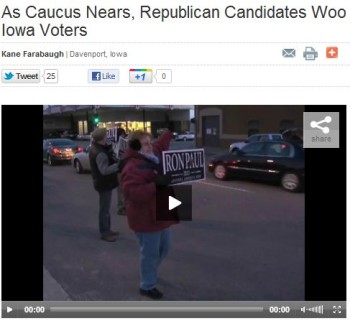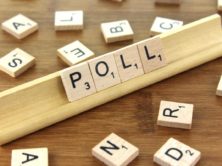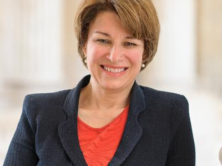
People in Iowa hit the streets (Credit: Voice of America, screenshot)
 With the Iowa Caucuses only days away, and close to three-quarters of potential voters reportedly undecided as to whom they will support, The New York Times recently enlisted some respected academics to engage in serious navel-gazing – assessing what Iowans really want from the Republican candidates.
With the Iowa Caucuses only days away, and close to three-quarters of potential voters reportedly undecided as to whom they will support, The New York Times recently enlisted some respected academics to engage in serious navel-gazing – assessing what Iowans really want from the Republican candidates.
Some critics, of course, are not happy with Iowa’s first-in-the-nation nomination contest. They make the (not unreasonable) argument that perhaps the one-tenth of one percent of Republicans who happen to live in the Hawkeye State should not be granted the tremendous influence in picking the parties’ presidential nominees that going first entails.
Two authors (current or past professors at the University of Iowa), David P. Redlawsk and Caroline J. Tolbert, disagree. They’ve written an apologia for Iowa’s pre-eminent position in the nomination process, Why Iowa?. And they wrote a short commentary for the Times that suggests Iowans are just like…people!
Iowans are not some exotic species. In fact, Iowa is pretty much the median state; not just geographically, but in the middle on 39 of 51 economic, social and diversity indicators, as shown by Michael Lewis-Beck and Peverill Squire. We shouldn’t expect Iowans to be all that different in what they care about in this election, and it turns out they aren’t.
Truthfully, until now I’d never once thought of Iowans as some exotic species. On the other hand, I’d never thought of the state as a microcosm of the whole country either. Yet, that’s essentially what Lewis-Beck and Squire cited above (two other academics who’ve taught at the University of Iowa) conclude after a really, really sophisticated statistical analysis of all sorts of variables that describe the states:
Is Iowa representative? Yes, at least reasonably so. And when it is not, that is often because it boasts a superior performance socially (e.g., educational attainment) or politically (e.g., voting turnout)… With respect to the leading dimension of economic conditions…Iowa is unambiguously the most representative state in the country…
All things considered, there seems no cause to take away Iowa’s first-in-the-nation presidential selection status. If one state must hold this position then it is hard to make a better pick.
What is it about teaching at the University of Iowa that engenders such loyalty to the state?
A Red Herring
O.K. Here’s the problem: The argument that the (present and former) Iowans – Redlawsk, Tolbert, Lewis-Beck, and Squire – are making is a red herring!
The issue is not whether the whole state of Iowa is generally representative of the nation. The caucuses are partisan events, and the criticism is that Iowa’s Republicans do not represent Republicans across the country, a similar argument made about Iowa’s Democratic voters. To go through a sophisticated statistical analysis, as do Lewis-Beck and Squire, to show that the whole state is more-or-less in the middle of many national socio-economic indicators, is completely beside the point – diverting attention from the real argument.
Iowa Republican Voters Compared with Republican Voters in Other States
Critics of the early state contests are concerned whether the undue influence of those states, especially Iowa and New Hampshire, distorts the democratic process, because the GOP voters there may be outliers from GOP voters nationally.
If not an exotic species, are Iowa voters nevertheless outliers from their party? The answer seems to be an emphatic Yes!
Shown in Table 1 is a summary of the results of all the exit polls conducted for the Republican primaries in 2008, presented in order of the scheduled contests.* For purposes of this article, I present data for only two variables: identification with being an evangelical/born again Christian, and political ideology.
The table shows that Iowa voters are really not “just like everyone else” when it comes to each of these two measures. Iowa GOP voters are a third more likely to be evangelical (60%) than the average of GOP voters in other states (45%) and a third more likely to be conservative (88%) than other voters (65%). And as shown in subsequent tables, those differences have significant consequences for which candidates are favored.
 |
| The table shows that Iowa voters are really not “just like everyone else” |
Both religious fervor and political ideology are highly correlated with voter preferences. As shown in Table 2, the evangelicals in Iowa in 2008 were three times more likely to vote for Mike Huckabee (46%) than were non-evangelicals (14%). Being an evangelical also affected voter preferences for the other candidates as well, especially in a negative direction for Mitt Romney.
 |
| See above a breakdown of 2008 Iowa caucus votes based on evangelical or not. |
This high correlation is not surprising, given that two-thirds of Iowa Caucus voters said the religious beliefs of a candidate mattered either “a great deal” (36%) or “somewhat” (31%) in helping them decide whom to support.
The fact that Iowa GOP voters are more conservative than the GOP nationally is also of significant consequence. As Table 3 shows, conservatives were much more likely to vote for Huckabee and Fred Thompson than were non-conservatives, and much less likely to vote for John McCain.
 |
| See above a breakdown of 2008 caucus votes by conservative or not conservative. |
In their Times article, Redlawsk and Tolbert argue that “Iowa voters are focused on the economy like everyone else.” That’s no doubt true. But perceptions on how to deal with the problems of the economy, and which candidates will best address them, vary significantly, depending on one’s perspective.
And the data show that the perspectives of Iowa’s Republican voters are definitely not like the rest of Republican primary voters – at least they weren’t in 2008, and there is no reason to believe the pattern will suddenly change in 2012. Yet, Iowa’s influence in screening out candidates has been well documented, depriving the rest of the Republican voters an opportunity to express their views on a full slate of candidates. (A similar argument can be made about New Hampshire, but that’s for another day.)
The two political parties seem content with that arrangement, or at least unable to change it. So be it. But we shouldn’t sugarcoat the process by pretending it is fully representative. It isn’t. No matter what misleading statistics can be generated to argue otherwise.
____________________________________________
*Exit polls were not conducted in caucus states (except Iowa, where an “entrance” poll was undertaken, because of media focus on the first contest), nor were exit polls conducted in a few other smaller states with primaries. The campaign for the GOP nomination was over in early March, and after the Mississippi Primary, no further exit polls were conducted. All results cited come from exit poll results posted on CNN’s 2008 election website.
Disclosure: iMediaEthics’ founder and publisher, Rhonda Roland Shearer, is an adjunct lecturer with the University of Iowa’s journalism program.
David W. Moore is a Senior Fellow with the Carsey Institute at the University of New Hampshire. He is a former Vice President of the Gallup Organization and was a senior editor with the Gallup Poll for thirteen years. He is author of The Opinion Makers: An Insider Exposes the Truth Behind the Polls (Beacon, 2008; trade paperback edition, 2009). Publishers’ Weekly refers to it as a “succinct and damning critique…Keen and witty throughout.”






